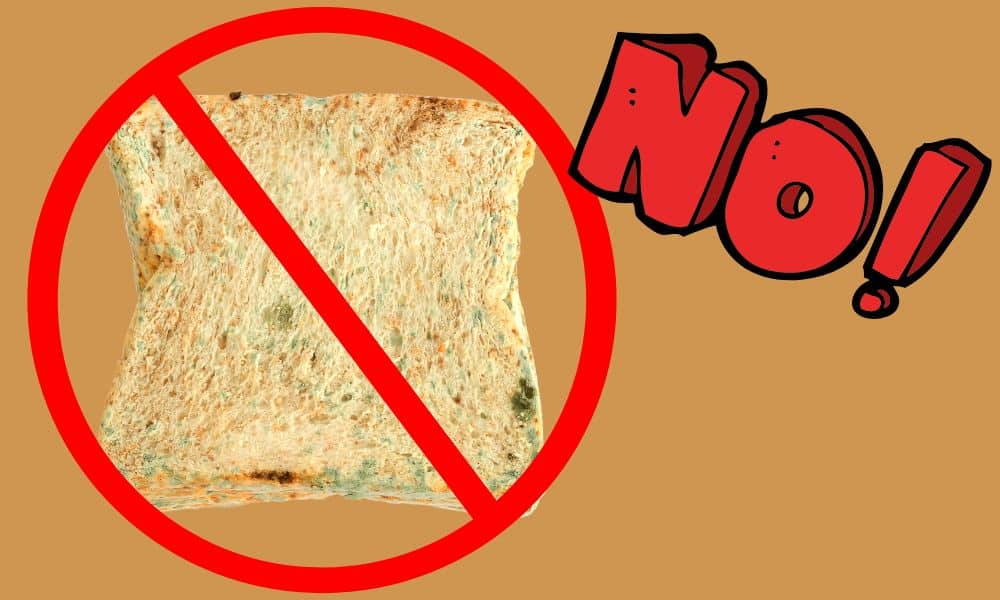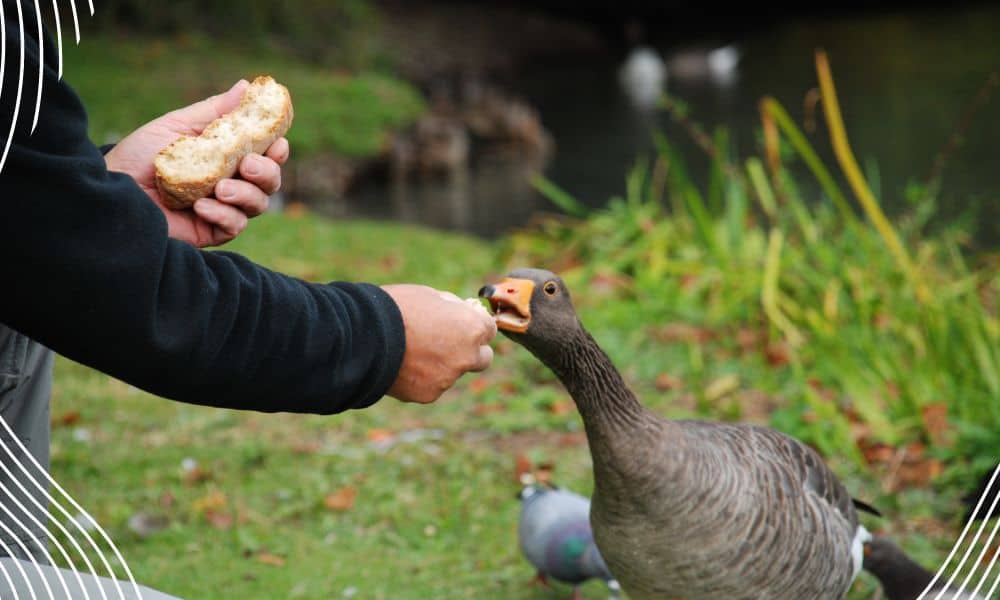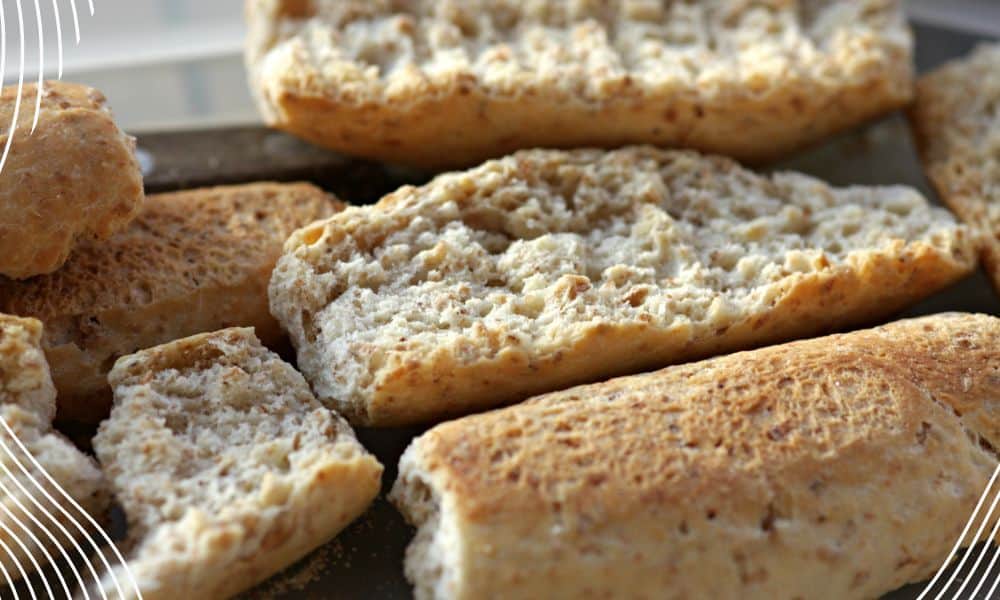Feeding bread to ducks feels like a classic tradition, whether you’re feeding your own ducks a treat or you’re wanting to feed the ducks at the local park.
Of course, although ducks will happily accept any kind of bread thrown their way, it’s vitally important that the bread is not moldy! – for the health and well-being of the ducks.
Here’s whether ducks can eat moldy bread, whether stale bread is OK to feed to ducks, and what can happen if ducks eat moldy bread!
Contents
Can Ducks Eat Moldy Bread?

Aside from the fact that bread isn’t the greatest thing for ducks to eat too much of, one thing that’s even more important is making sure there’s no mold at all on the bread!
Although ducks eat a lot of wacky and weird things, mold in any quantity can be harmful to ducks.
Moldy bread, or any moldy food for that matter, can lead to various health problems and is a leading cause of a common fungal infection called aspergillosis.
Aspergillosis targets the lungs of poultry and birds and can very easily be fatal. Plus ducks are particularly susceptible!
This is exactly why you should not feed ducks any kind of moldy bread or other moldy foods (this goes for chickens and other poultry too!).
Can Ducks Eat Stale Bread?

If bread is kept in a dry environment, and the bread itself isn’t overly moist, it will more likely become stale before it starts to develop any kind of mold.
However, it’s important to really inspect the stale bread, as mold can come in all kinds of shapes and colors, including white which can be hard to spot!
If you’re certain there’s no mold present at all, then ducks CAN eat stale bread.
But, unless you’re 100% certain there is no mold, it’s best to look for alternative treats! Plus, even fresh bread is considered to be a treat food for ducks, and should only be fed to them in moderation anyway!
Note: you shouldn’t feed ducklings any kind of bread, stale, moldy, or fresh – as it’s simply not healthy for them!
What Happens If Ducks Eat Moldy Bread?

So what happens if you accidentally fed ducks some moldy bread?
Don’t worry, it doesn’t mean they are suddenly doomed!
Many ducks have natural immunity. But, this doesn’t mean they are entirely resistant, especially if they ingested or have been exposed to A LOT of mold.
If your ducks have eaten some moldy bread, then the main risk is that they develop Aspergillosis – a common fungal infection caused by mold.
Ducks Can Get Aspergillosis From Moldy Bread
Aspergillosis, an infection caused by the fungus aspergillus, infects the lungs when ducks or other animals inhale its spores (or ingest them).
However, ducks normally don’t show any obvious signs of illness until they reach an advanced stage of infection, even after weeks or months later.
Because of this latency, you may not even realize it was mold that caused the infection to begin with!
Aspergillosis Can Be Fatal To Ducks
The spores of the aspergillus fungus colonize the lungs of ducks when inhaled or ingested.
Over time, the infection spreads, and eventually, it produces poisonous chemicals called aflatoxins.
Gradually these aflatoxins spread to other organs and tissues in the duck’s body, including the brain, kidneys, and bone marrow.
Even though aspergillosis is not transmissible between ducks, unfortunately, it can be fatal for those affected.
Preventing Aspergillosis
What’s most concerning about aspergillosis is there really isn’t an effective treatment.
The fungus is very resistant to disinfectants in the environment, as well as antibiotics in the ducks’ bodies.
Still, the best way to prevent Aspergillosis is be ensuring your ducks get the least amount of exposure to mold as possible.
This is exactly why you should never feed ducks moldy bread, or anything else moldy either.
Additionally, you should regularly check for mold growth in your coop or in the environment, and make sure your feed isn’t wet and is stored in a dry and safe environment to minimize any chances of mold growth.
What Can You Feed Ducks Instead Of Bread?
To be clear, bread should only ever be given to ducks as a rare treat.
So, whether you’ve just discovered your bread is actually moldy, or you’re looking for a healthier treat to feed ducks, you can consider:
- Cereal: Cereals like rolled oats, oatmeal, or even Rice Krispies contain much higher nutritional content compared to bread – and have very little risk of carrying mold. But, as much as possible avoid feeding ducks any sugary or processed cereals.
- Fruits: In general, fruits are actually considered healthy for ducks to eat – so long as they are only fed in moderation! Where possible, avoid feeding ducks overly acidic, citrus fruits, like oranges or lemons. Instead, fruits like blueberries or blackberries are a great treat for ducks!
- Leafy Greens: Leafy greens contain some of the highest nutritional content among most traditional vegetables. Steamed or raw leafy greens make for a perfect, nutritious treat for ducks and other poultry.
- Soft Vegetables: Soft vegetables are also great for ducks! Try cutting up vegetables like zucchini, cooked carrot, peas, or beans and feed them to ducks!
Wrap Up
So ducks should never consume moldy bread – no matter how little mold you can see on it!
When ingested or inhaled, the fungal spores within the mold can very easily lead to illness or infection, namely Aspergillosis.
Stale bread is OK to feed to ducks, so long as there is absolutely no mold growing on it.
In saying that, since bread isn’t the healthiest of foods for ducks, try feeding them some non-acidic fruits, leafy greens, soft vegetables, or even healthy cereals instead!
